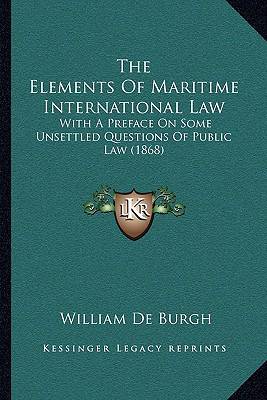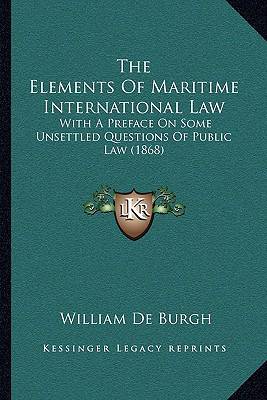
- Afhalen na 1 uur in een winkel met voorraad
- Gratis thuislevering in België vanaf € 30
- Ruim aanbod met 7 miljoen producten
- Afhalen na 1 uur in een winkel met voorraad
- Gratis thuislevering in België vanaf € 30
- Ruim aanbod met 7 miljoen producten
Zoeken
The Elements Of Maritime International Law
With A Preface On Some Unsettled Questions Of Public Law (1868)
William De Burgh
Paperback | Engels
€ 40,95
+ 81 punten
Omschrijving
The Elements of Maritime International Law is a comprehensive book written by William De Burgh in 1868. It is a detailed analysis of the principles, rules, and customs governing maritime law. The book covers a wide range of topics related to the sea, including the rights of ships, navigation, piracy, maritime commerce, and the laws of war at sea.The author begins with a preface on some unsettled questions of public law, which sets the stage for the rest of the book. He then delves into the history and development of maritime law, providing a thorough overview of its evolution over time. De Burgh also discusses the various international agreements and treaties that have shaped modern maritime law.The book is divided into several sections, each focusing on a specific aspect of maritime law. The author provides detailed explanations of the legal principles and rules governing each topic, including the rights and duties of shipowners and seamen, the carriage of goods by sea, marine insurance, and salvage.De Burgh's writing is clear and concise, making the book accessible to both legal professionals and lay readers. The Elements of Maritime International Law is a valuable resource for anyone interested in understanding the legal framework that governs maritime activities.This scarce antiquarian book is a facsimile reprint of the old original and may contain some imperfections such as library marks and notations. Because we believe this work is culturally important, we have made it available as part of our commitment for protecting, preserving, and promoting the world's literature in affordable, high quality, modern editions, that are true to their original work.
Specificaties
Betrokkenen
- Auteur(s):
- Uitgeverij:
Inhoud
- Aantal bladzijden:
- 274
- Taal:
- Engels
Eigenschappen
- Productcode (EAN):
- 9781165102686
- Verschijningsdatum:
- 10/09/2010
- Uitvoering:
- Paperback
- Formaat:
- Trade paperback (VS)
- Afmetingen:
- 152 mm x 229 mm
- Gewicht:
- 367 g

Alleen bij Standaard Boekhandel
+ 81 punten op je klantenkaart van Standaard Boekhandel
Beoordelingen
We publiceren alleen reviews die voldoen aan de voorwaarden voor reviews. Bekijk onze voorwaarden voor reviews.











